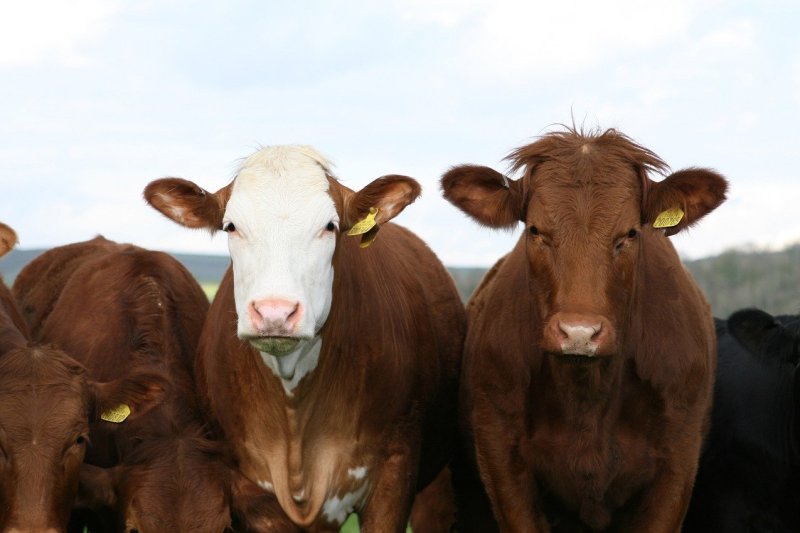Rising temperatures could boost livestock methane emissions, new research warns. Photo by Shutterbug75/
Pixabay
Oct. 7 (UPI) -- Warming temperatures may inspire a feedback loop of climate-altering flatulence, according to a new paper published Wednesday in the journal Trends in Ecology and Evolution.
Over the last decade, atmospheric methane concentrations have risen dramatically, and studies suggest livestock and their digestive systems are responsible for roughly half of the increase in methane emissions.
Scientists suggest the problem is likely to get worse as temperatures rise.
According to the new paper, a review of scientific literature on livestock health and methane emissions, rates of parasitic worm and bacterial infections are expected to rise as the planet warms. When cows, sheep and other animals are battling an infection, they emit more methane.
"Some parasitic worms spend part of their life cycle in the external environment -- on grass, for example -- and temperature can affect the rate at which these parasites develop into a life stage that can infect animals," lead study author Vanessa Ezenwa told UPI in an email.
"For example, in some areas, colder temperatures during winter months slow down or stop the development of these parasites," said Ezenwa, a professor of ecology at the University of Georgia.
Several studies have shown parasitic and bacterial infections increase the amount methane produced per unit of food consumed by livestock.
"It's not known why this happens, but it could be related to the disruption caused by these parasites in the GI tract which is where methane is produced through bacterial fermentation of plant material," Ezenwa said.
Because sicker livestock are often less productive -- cows plagued by parasites yield less milk -- farmers need more food and animals to maintain production levels, boosting methane emissions.
Bacteria and parasitic worms aren't the only infection agents expected to proliferate in a warmer world.
"Recently, the protozoan parasite that causes trypanosomiasis, or sleeping sickness, have been linked to increased methane emissions in livestock," Ezenwa said.
Ezenwa and her research partners used data from their scientific review to model the impacts of parasitic infections on livestock methane emissions. The simulations revealed a disconnect between current models and reality.
"Current and future contributions by ruminant livestock to global methane emissions may be substantially underestimated," Ezenwa said. "Given that ruminant livestock are responsible for nearly half of all the methane produced from living sources, this is an important insight that we hope will prompt further research to understand the connections between livestock diseases and methane emissions."
Ezenwa hopes the newly published paper will inspire other scientists to investigate the effects of rising temperatures on a variety of infectious agents, as well as the effects of those agents on methane production.
To slow methane emissions by ruminant livestock, researchers must identify and combat the most problematic parasites and bacteria strains.
Ezenwa said scientists must avoid studying parasites, bacteria and methane emissions in isolation. Instead, researchers need to focus on untangling to the complex connections between climate warming, infectious diseases and greenhouse gas emissions.
"To date, studies on the effects of climate warming on infectious diseases in animals have been mostly decoupled from studies on the effects of animal diseases on greenhouse gas emissions," she said. "However, these problems are connected and studying them together is necessary to better understand and mitigate both the challenge of climate change and infectious disease."















